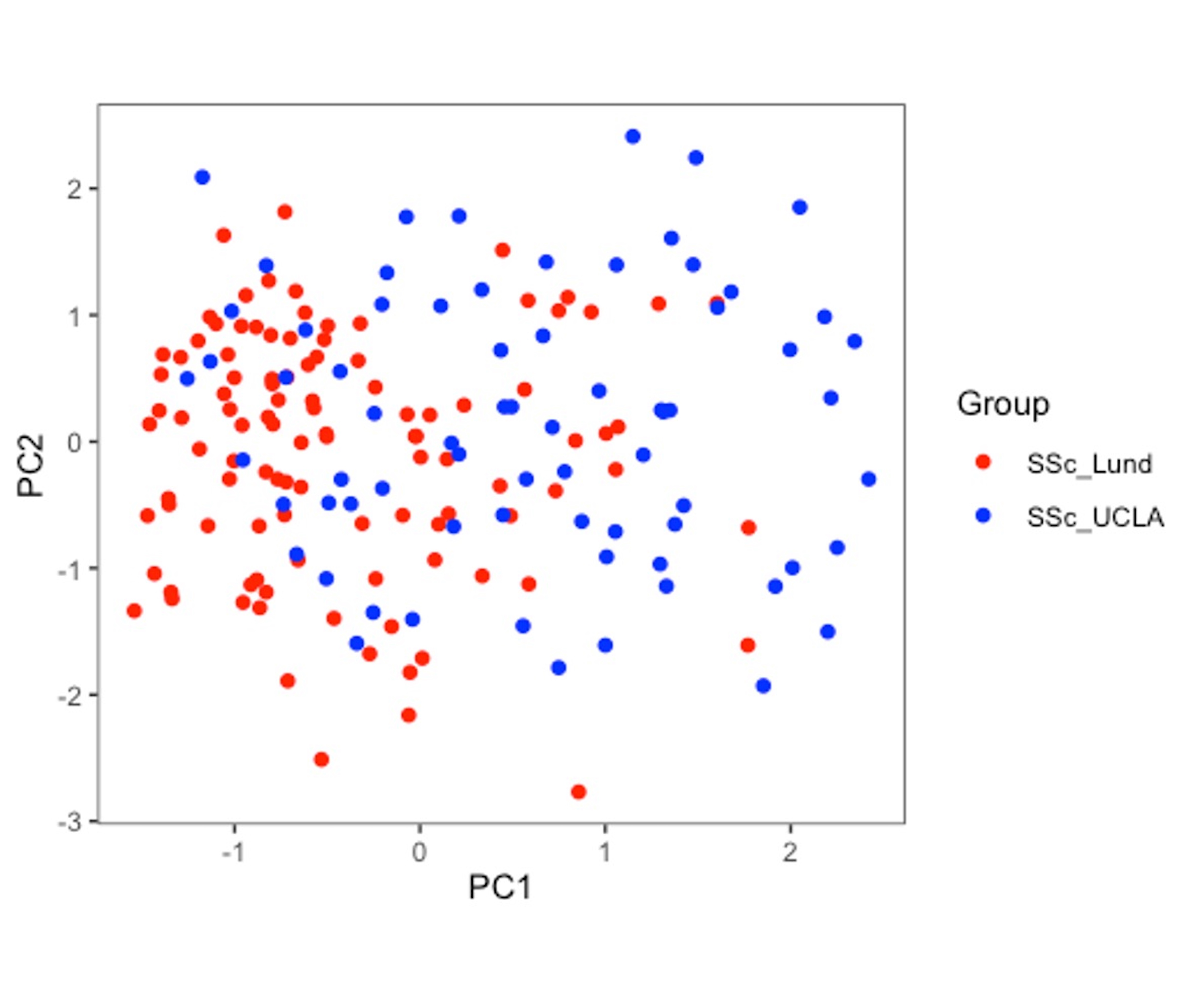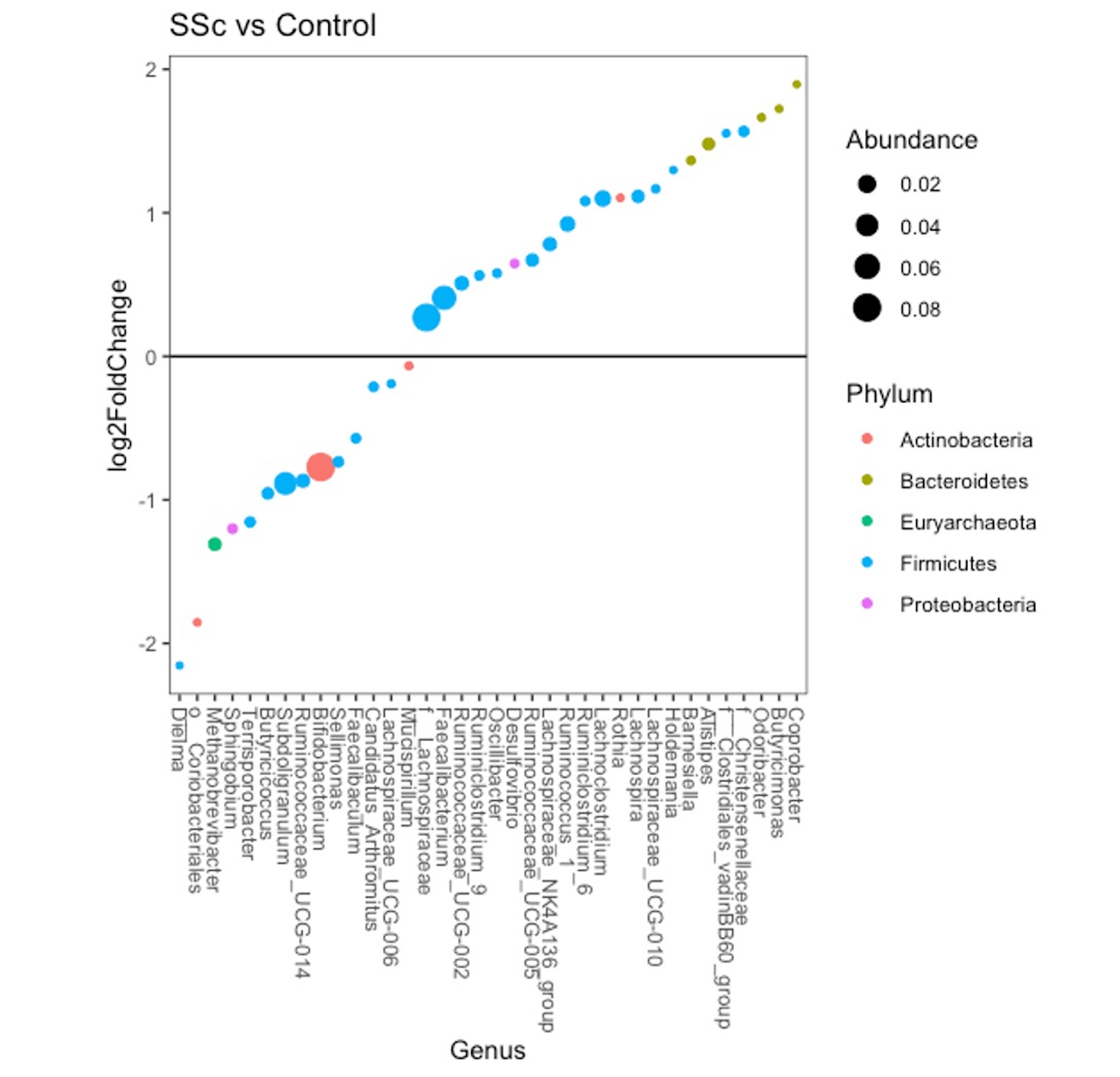Session Information
Date: Monday, November 9, 2020
Session Type: Abstract Session
Session Time: 4:00PM-4:50PM
Background/Purpose: Previous studies have demonstrated alterations in GI microbiota of patients with systemic sclerosis (SSc) compared with healthy controls [1]. However, these prior studies did not adequately examine the impact of disease features and patient characteristics on microbial composition. The purpose of the present study was to examine associations between specific SSc disease features/patient characteristics and GI microbial composition using two independent SSc cohorts and compare GI microbiota between cohorts.
Methods: Patients fulfilling the 2013 ACR/EULAR Classification Criteria for SSc were recruited from the rheumatology clinics at Lund University, Sweden and the University of California, Los Angeles (UCLA). Unaffected controls were also recruited at Lund University. All participants provided stool specimens for 16S rRNA sequencing. Extensive clinical data were collected to evaluate the effects of specific disease features on lower GI microbiota. Alpha diversity was assessed by metrics of richness, evenness, and phylogenetic diversity. Beta diversity analysis was performed with DEICODE in QIIME2. Multivariate negative binomial models were used to identify differentially abundant bacterial genera associated with SSc disease features and cohort (UCLA SSc vs. Lund SSc; Lund SSc vs. Controls).
Results: Compared with the Lund SSc patients (N=106), UCLA SSc patients (N=71) had increased disease duration (median 7.1 vs. 2.0 years) and a higher prevalence of diffuse cutaneous disease (44% vs. 19%), interstitial lung disease (87% vs. 33%), Scl-70 antibody positivity (31% vs. 18%), and small intestine bacterial overgrowth [SIBO] (22% vs. 5%). However, both groups had a similar age, %female, and BMI. UCLA SSc patients had decreased alpha diversity (P< 0.0001 for all alpha diversity metrics) and altered beta diversity (P=0.0001; Figure 1) compared with Lund SSc patients. Factors significantly associated with alpha and/or beta diversity included age, sex, diffuse disease, disease duration, smoking history, and SIBO. After adjusting for the aforementioned factors, the Lund cohort had increased abundance of commensal genera (e.g. Bifidobacterium) and decreased abundance of potentially pathobiont genera (e.g. Streptococcus) compared with the UCLA cohort (Figure 2). Compared with unaffected controls from Lund (N=85), Lund SSc patients had increased abundance of pathobiont genera (e.g. Desulfovibrio) (Figure 3), consistent with our prior studies.
Conclusion: In the first study to examine the associations between specific disease features and GI microbial composition in two independent SSc cohorts, we found that both disease duration and SSc subtype independently affect microbial composition and should be considered in future SSc microbiome analyses. Even after controlling for potential confounders, genus level differences were observed between the two cohorts, suggesting that external factors, such as diet, geography and genetic factors, may affect GI microbial composition and should be taken into account in future studies.
References
- Volkmann ER, et al. Arthritis Rheum 2016.
 Figure 1. Significant differences in the beta diversity of the Lund-SSc (Red) and UCLA-SSc (blue) patients as demonstrated by principal coordinate analysis plots of the robust Aitchison distance. Each dot represents a patient sample. The P-value (0.0001) was calculated by analysis of variance using distance matrices.
Figure 1. Significant differences in the beta diversity of the Lund-SSc (Red) and UCLA-SSc (blue) patients as demonstrated by principal coordinate analysis plots of the robust Aitchison distance. Each dot represents a patient sample. The P-value (0.0001) was calculated by analysis of variance using distance matrices.
 Figure 2. Genus level taxa with significant (q < 0.1) differential abundance in SSc patients from Lund, Sweden, and UCLA. Circles with a positive fold change score represent genera with increased abundance in the UCLA-SSc group and those with a negative fold change score represent genera with increased abundance in the Lund-SSc group. The color of the circle signifies the phylum level of the genera with differential abundance. The size of the circle indicates the relative abundance of the specific genus.
Figure 2. Genus level taxa with significant (q < 0.1) differential abundance in SSc patients from Lund, Sweden, and UCLA. Circles with a positive fold change score represent genera with increased abundance in the UCLA-SSc group and those with a negative fold change score represent genera with increased abundance in the Lund-SSc group. The color of the circle signifies the phylum level of the genera with differential abundance. The size of the circle indicates the relative abundance of the specific genus.
 Figure 3. Genus level taxa with significant (q < 0.1) differential abundance in SSc patients and unaffected controls from Lund, Sweden, after adjusting for sex and age. Circles with a positive fold change score represent genera with increased abundance in the Lund-SSc group and those with a negative fold change score represent genera with increased abundance in the Lund-Control group. The color of the circle signifies the phylum level of the genera with differential abundance. The size of the circle indicates the relative abundance of the specific genus.
Figure 3. Genus level taxa with significant (q < 0.1) differential abundance in SSc patients and unaffected controls from Lund, Sweden, after adjusting for sex and age. Circles with a positive fold change score represent genera with increased abundance in the Lund-SSc group and those with a negative fold change score represent genera with increased abundance in the Lund-Control group. The color of the circle signifies the phylum level of the genera with differential abundance. The size of the circle indicates the relative abundance of the specific genus.
To cite this abstract in AMA style:
Andréasson K, Lee S, Lagishetty V, Wu M, Howlett N, English J, Hesselstrand R, Jacobs J, Volkmann E. Disease Features of Systemic Sclerosis Are Associated with Alterations in Gastrointestinal Microbial Composition in Two Independent Cohorts [abstract]. Arthritis Rheumatol. 2020; 72 (suppl 10). https://acrabstracts.org/abstract/disease-features-of-systemic-sclerosis-are-associated-with-alterations-in-gastrointestinal-microbial-composition-in-two-independent-cohorts/. Accessed .« Back to ACR Convergence 2020
ACR Meeting Abstracts - https://acrabstracts.org/abstract/disease-features-of-systemic-sclerosis-are-associated-with-alterations-in-gastrointestinal-microbial-composition-in-two-independent-cohorts/
